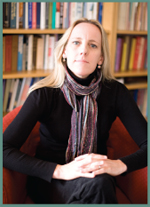I Say We All Graduate

It’s graduation season, which means lots of pomp and circumstance (even for my daughter who, believe it or not, just participated in a two-hour ceremony promoting fifth graders to middle school). But the kind of pomp we’re all damned tired of—everyone save the NRA and its stooges—is what follows the too-familiar horror this country’s become infamous for: the moment of silence after a mass shooting.
In a June 14, 2016, Washington Post editorial titled “Why I Walked Out of the House’s Moment of Silence for Orlando,” Rep. Jim Himes (D-CT) excoriated Congress for not acting to curb gun violence in the United States. Days before, fifty people had died in a rampage at a gay nightclub in Orlando, Florida, with scores more injured, and Himes (who earlier this year sponsored the AHA’s Darwin Day resolution) had had it with thoughts and prayers. “We should be shouting the names of the people who are killed in preventable violence,” Himes told the Post in a follow-up interview, “not standing there in some mock and tepid ritual of sanctity—this smug ‘we care’ statement in the face of gross negligence.”
The next day Senator Chris Murphy (D-CT) valiantly led a fourteen-hour filibuster on the Senate floor to push his legislative body to vote on two measures: 1) to expand background checks for guns purchased online and at gun shows, and 2) to prohibit anyone the attorney general suspects of being a terrorist from buying firearms and explosives. And on Wednesday, June 22, Democratic members of the House staged a nearly 26-hour sit-in at the Capitol. I commend these efforts by lawmakers pushing for some humane, responsible action on guns.
Speaking truth to power is something the subject of this issue’s interview has been doing for most of his life. Noam Chomsky’s thoughts on the history of our nation’s foreign affairs probably won’t stir warm feelings of patriotism, but the renowned linguist, philosopher, historian, cognitive scientist, and critic isn’t so much a dissident as he is a truth junkie, not a conspiracy theorist but a connector of dots on a very extensive and historical map. And so a good dose of enlightenment comes to those who listen.
On the global warming front, our Science and Religion Correspondent Clay Farris Naff is back with a cover story on what can be done to take carbon dioxide out of the atmosphere. The most promising candidate seems to be bioengineered algae, the benefits and challenges of which he discusses in “Humanity’s Last Stand.” As his story went to press, news broke of an innovation in carbon capture and storage. Iceland reports it’s found an economical way to mix CO2 with water and inject it underground. There it rapidly turns into solid carbonate—a process Naff first reported on in a 2014 cover story about using CO2 for geothermal power.
As engaged citizens continue to assess what threatens us, humanists can find some comfort herein, in the wry and compassionate words of Kurt Vonnegut and his confrere Herb Silverman. Speaking to college graduates thirty-five years ago, Vonnegut urged them to stand up to those in power. “Persuasive guessing has been at the core of leadership for so long for all of human experience so far that it is wholly unsurprising that most of the leaders of this planet, in spite of all the information that is suddenly ours, want the guessing to go on,” he said, instructing the graduates to becoming wise guys and wise girls. Silverman likewise urges us to do something meaningful with our lives and suggests that putting a happy face on atheism and cultivating a sense of humor are necessary components in that effort. And David Swanson, in his Up Front editorial, sees the growing identity of the global citizen (he cites Muhammad Ali as a prime example) as a step toward peace.
It all reminds me a bit of what my daughter’s teacher told the graduating class at Barnsley Elementary School last night. Rise and shine, he said. I say we all graduate. And let’s replace the pomp and circumstance with love and wise action.
